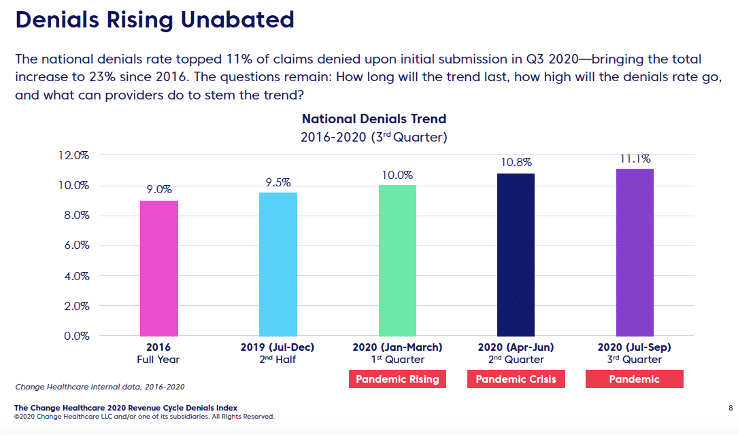Which is better, outsourcing or insourcing your billing? As is often the case, the answer is, ‘It depends on your practice.’ We’ve seen practices thrive under both scenarios, and Ingenious Med works with your practice or health system whether you insource or outsource billing, to ensure that physician practices and health systems can capture charges and collect revenues efficiently for both physicians and administrators.
With rising claims denial rates, growing demands on physicians, and ever thinner margins, making it easy to accurately capture and submit bills has never been more critical.
Since 2016, the rate of claims denials has increased by 23%, according to the Change Healthcare 2020 Denials Index. COVID has accelerated that trend, with an 11% increase nationally since its onset.

The Pros and Cons of Outsourcing
Currently, about a quarter of RCM is outsourced; that percentage is expected to climb to 40% in the coming years as the outsourcing market continues to grow. As of 2020, it was valued globally at $14.6B.
Each practice or health system should weigh the pros and cons of outsourcing in light of its current capabilities and limitations. Larger practices may have the internal staff expertise and technology/infrastructure to successfully manage billing inhouse, while smaller practices may not have the budget, the desire, or the experience to do so.
If your billing practices are inefficient, if you lack up-to-date technology or are not tech savvy, if you face challenges recruiting or retaining good billers and coders, or if you just don’t want to manage these processes inhouse, outsourcing can make sense for your healthcare organization.
Ingenious Med partners with a number of large, highly respected billing companies, including one that serves over 250 practice locations in 40 states. A vice president from this company explains, “Outsourcing takes a significant burden off physician practices, enabling them to focus on patient care.
The advantages of outsourcing include having advanced IT, security and other infrastructure; advanced systems and processes; and extensive knowledge of the industry.”
A hypothetical analysis of net collections for a three-physician practice showed that partnering with outsourcers could potentially result in a 20% revenue increase. That is consistent with results that this billing company has experienced; on average, clients can increase their revenues 10% to 15% when they switch to outsourcing.
However, practices should never expect their denial rates to go down to zero. There will always be some unavoidable denials, such as when a patient loses insurance coverage on the day of service. If your practice moves to outsource its billing, it should seek a company that can meet at least a 95% clean claims rate.On the flip side, keeping billing inhouse may provide your practice with greater control over RCM processes and may keep costs down if the practice can create and maintain sufficient expertise at a lower cost.
The Advantages of Outsourcing to a Billing Partner plus Ingenious Med
Some of the benefits that your practice can realize by outsourcing billing in combination with using Ingenious Med include:
- Facilitating accurate coding
- Minimizing the need to train physicians to code
- Preventing missed charges
- Streamlining data transfer
Kelly Cain, Senior Sales Executive, Ingenious Med, notes, “In 2022, when optimizing revenues has perhaps never been more essential, practices need a fully automated charge capture system that includes reconciliation and the ability to manage leakage. Outsourcing to a company that partners with Ingenious Med streamlines this process and improves communication among providers, billers, and coders, so you collect all the revenue you’ve earned.”
Ingenious Med makes it easier for physicians to accurately capture revenues, providing a single place to take care of everything, rather than requiring providers to access different rounding and other sources. It streamlines the reconciliation process and ensures that the practice isn’t missing billing for any services they provided.
Hospitalists and other physicians can take advantage of Ingenious Med’s features that make coding easier, including assigning an appropriate CPT code. Even providers who aren’t typically good coders can bill accurately and at the most appropriate level of service.
Cain encourages physician groups to avoid the common trap of first focusing on reducing their denial rates. She says, “We encourage them to first seek to get it right on the front end, by accurately charging for all of the services they deliver. That’s how Ingenious Med can usually pay for itself in the first year.”

Partnering with a billing company and Ingenious Med also can enable your practice to streamline exporting accurate data to the outsourcer. Your providers can send codes to the outsourcer via a data file transfer (DFT), facilitating the delivery of key data such as the rendering provider, and CPT, diagnosis, and MIPS codes where applicable.
Whether you insource or outsource, the right point of care tools help you collect more with less work. If you outsource your billing, check with your outsourcing partner to see if you can take advantage of the point of care capabilities Ingenious Med offers to further enhance and streamline your billing, reporting and benchmarking capabilities. And if you keep your billing inhouse, we can deliver these same capabilities by working directly with your practice. For more information on optimizing billing and revenues, read our blog, “5 Ways Independent Physicians Can Capture and Keep More Revenue.”
